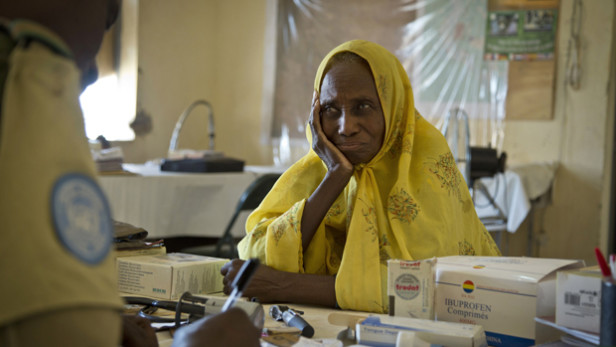Women, Peace & Security
Source: Devex
The number and scale of humanitarian crises erupting in recent months is quite extraordinary — conflicts in Central African Republic, Gaza, Iraq, Syria, South Sudan and Ukraine and the outbreak of Ebola in West Africa.
For the first time since World War II, the number of refugees, asylum seekers, and internally displaced people worldwide exceeds 50 million people. The majority of these displaced persons are women and children — categories with unique health care requirements.
A woman receives a free consultation at a medical clinic in Gao, Mali, run by the the Niger contingent of the United Nations Multidimensional Integrated Stabilization Mission in Mali.
A significant number of these displaced women are pregnant or lactating. Pregnant women unfortunate enough to give birth while fleeing their homes have little chance of a medically assisted, or even a clean, delivery of their baby. All will require antenatal, delivery and postnatal care and related emergency obstetric support, but few will get it. Many will give birth in filthy conditions on the sides of roads, in public and amid violence.
The majority of these crisis zones already had a high rate of maternal mortality, but this soars at times of upheaval. In Syria, almost 200,000 pregnant women are in need of urgent care. In Iraq, the United Nations Population Fund gives the number of pregnant women and girls at 60,000.
UNFPA predicts that more than 120,000 pregnant women in the Ebola-affected countries of Guinea, Liberia and Sierra Leone could die of complications of pregnancy and childbirth over the next year — if the required obstetric care is not urgently provided. As UNFPA Executive Director Babatunde Osotimehin said recently, "Ebola is not only killing those infected, but also those affected."
'Simply not a priority'
The capacity of medical facilities to care for pregnant women is greatly reduced at times of crisis. Facilities are regularly damaged and destroyed during military conflicts: in Syria more than 60 percent of hospitals have been destroyed. Those that remain operational are overwhelmed with treating the injured, while the treatment of pregnant women is simply not a priority. It is important to remember that these hospitals and clinics will take months and years to rebuild.
It is estimated that 60 percent of the total Ebola fatalities in West Africa have been women. In Liberia, it is reported that 75 percent of victims are women. The reason is down to gender roles in patriarchal societies. In these countries, women tend to be the carers for the sick and are also usually responsible for preparing bodies for funerals. In selflessly caring for and bathing their family members, women are exposed to Ebola.
Another problem in many of today's conflicts is rampant sexual violence. In crisis zones, there is insufficient medical and psychological care for the victims of such violence. Because family planning supplies and services are difficult to access at this time, sexual violence also results in unwanted pregnancies and the spread of sexually transmitted infections.
In South Sudan, both sides of the conflict are perpetrating rape, gang rape, abduction, sexual slavery and forced marriage. About 74 percent of the victims of these acts are under 18 years of age, with one reported victim only two years old. "In my 30 years of experience, I've never witnessed anything like what I saw," commented U.N. Envoy Zainab Hawa Bangura, following her recent visit to the country. And in Iraq there are widespread reports of women and girls exposed to sexual violence and sold into sexual slavery by the armed group known as Islamic State.
A call for EU action
During his confirmation hearing, the new European Commissioner for Humanitarian Aid and Crisis Management Christos Stylianides highlighted the plight of women and girls in humanitarian crises. It is vital that he and the new High Representative for Foreign Affairs and Security Policy Federica Mogherini, pay particular attention to the situation of women and their access to healthcare in responding to the current crises.
While the EU has been sluggish in facing up to the Ebola crisis, it is encouraging that the European Council has now decided to increase EU financial help towards tackling the disease to 1 billion euros ($1.24 billion) and has appointed Commissioner Stylianides to head up the EU's response.
However, it is unfortunate that EU leaders did not address the gender-biased nature of the disease in their recent Council Conclusions — our Ebola response absolutely needs to address this feature of the crisis. A clear emphasis must be put on preventative measures to combat the disease, which should include the availability of sexual and reproductive health services and supplies. At the beginning of the AIDS epidemic we concentrated on the treatment of victims and did not put an equal importance on prevention. This was a major mistake from which we are still attempting to recover.
The Ebola outbreak highlights how weak health systems of poor countries can crumble under strain. This underscores the need for new European Commissioner for International Cooperation and Development Neven Mimica to direct EU development policy towards helping developing countries to build well functioning and durable health infrastructures that seek to ensure access for all.
Without such systems, these countries will be condemned to a never-ending cycle of health crises.

